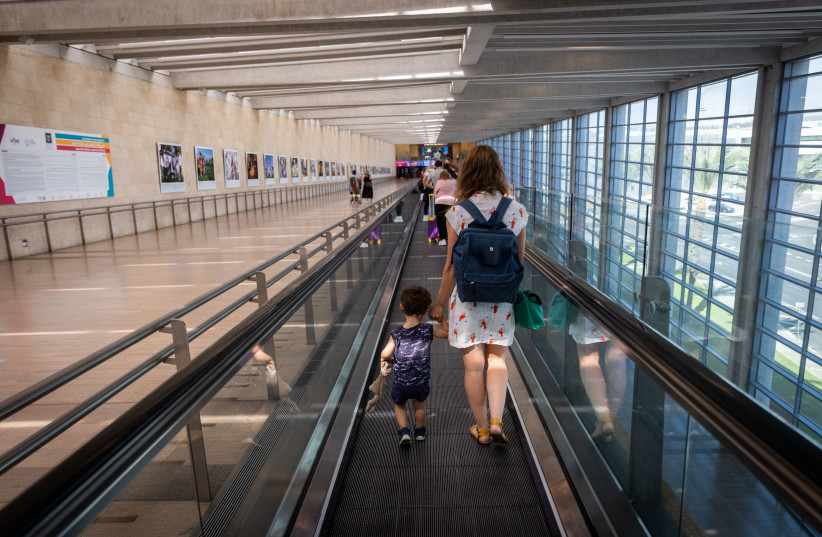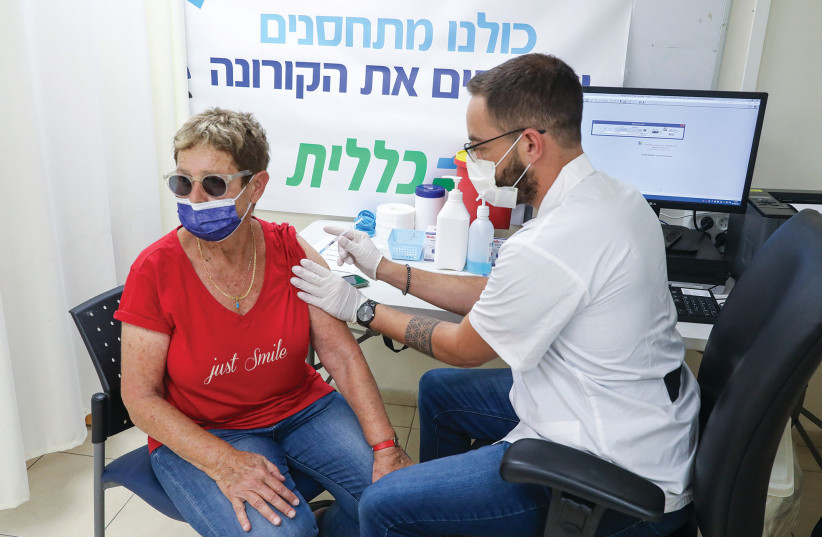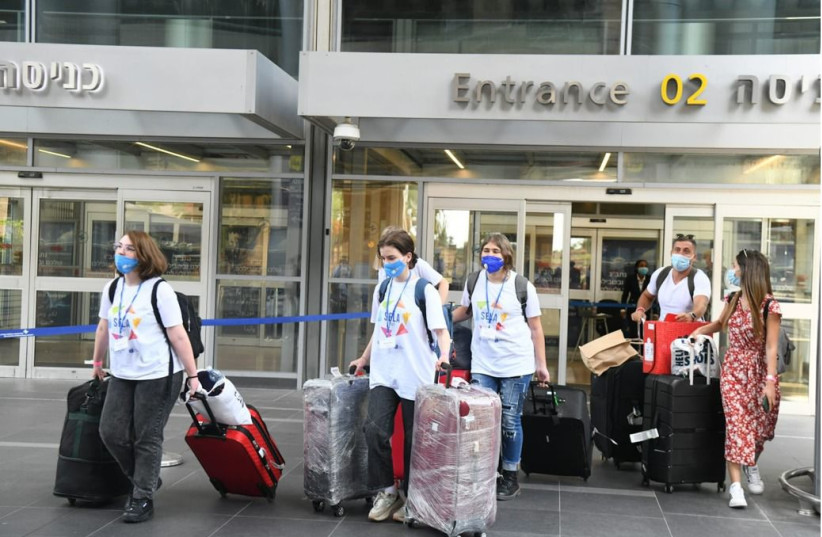Throughout the COVID-19 crisis, Israeli officials repeatedly failed to take into account the connection of Diaspora Jewry to the country as they made decisions on issues of health and the economy.
In an era when nearly all polls show the Jewish connection for Israel declining, especially among young Jews, the situation could lead to a catastrophic decrease in support for the Jewish state.
On Sunday night, thousands of people tried to board planes to return to Israel after more than 18 months of being banned from the Jewish state, as Israel’s new travel rules went into place on November 1. But when they arrived at airports with all of the requested documentation, they were unable to board their flights.
The required entry form was not yet updated on the Health Ministry website, and the airlines had not been informed of the change in policy. It took hours of tears and stress until Health Minister Nitzan Horowitz reportedly took action and had his ministry tell the airlines they could allow incoming passengers with vaccination documentation to board their aircrafts.
Still, some people never made it on the plane.

The situation highlights that the majority of officials do not understand the intricate, time-consuming and expensive preparations involved for most foreigners to travel to Israel from halfway across the world. They do not recognize the longing and excitement that some of these tourists – or in many cases, family members and friends of people living in Israel – feel when they prepare for a “mission” to the country.
“There has been a total lack of care for human emotions and the mental health of those trying to come to Israel throughout the entire corona crisis,” said Yad L’Olim founder Dov Lipman, who has been helping first-degree relatives of new immigrants get permission to come to Israel for the past several months.
Barring Diaspora Jews and Christian Zionists from entering Israel has also sent a message to these potential visitors that they are not needed and that tourism is not really a part of the country’s national and historic identity, but rather something nice to have that Israel can do fine without.
Israel logically went to great pains to protect its start-up culture, to send parents back to work and children back to school. But it waited until the very end of a fourth wave of the virus to find a method to ease entry for foreign nationals – and many believe the new rules make the situation even more complicated, at least for some.
For example, people who have recovered from COVID-19 and do not live in one of the countries that provides digital recovery certificates are being banned from entering Israel. On the other hand, people with paper vaccination certificates can be let inside.
The Health Ministry cited concerns over forged PCR-positive results and recovery certificates as the reason for this decision. However, it is equally as easy (if not easier) to mock up a US Centers for Disease Control and Prevention vaccine card as a PCR test, making the decision seem illogical.
Additionally, Israelis are considered fully vaccinated by the Pfizer vaccine or a Pfizer booster within seven days of getting the second shot or the third jab. But in an unexpected turn, just days before the new travel guidelines were rolled out, the Health Ministry changed the waiting period between the vaccine and being considered fully protected to 14 days – only for tourists. This means that people who ran out to get a booster and bought a ticket to come to Israel one week later were now ineligible to enter.

Nowhere did it say in the new regulations that travel insurance was required anymore to enter the country, and there is no form that requests it. However, the Health Ministry told The Jerusalem Post it is necessary, and they would need to add this information to the website because “they may be asked to present it at the airport.”
“Once rules and procedures were made due to health concerns, the process needed to be clear, and there needed to be actual implantation of those decisions,” Lipman said. “There has been a colossal failure on both fronts, and this continues until today.”
“The hoops, hurdles, anxieties and stress that Jews have had to go through to get to Israel, in accordance with the rules, has led to many feeling that Israel doesn’t truly welcome them to the Jewish state,” he said.
The situation, of course, did not start with the Bennett administration, but dates back to mid-March 2020 when former prime minister Benjamin Netanyahu barred all foreigners from entering the country in the first place.
It took until April 2021 for Israel to begin granting entry permits to vaccinated first-degree relatives of people living in Israel. But even then, the process of entry was complicated and convoluted, and many struggled to get permission to come.
This June, the government began allowing small groups of vaccinated tourists into Israel as part of a pilot program, which was supposed to expand in July to allow vaccinated individual tourists into the country. But letting individual travelers in was continually pushed off – first to August 1, then indefinitely – until this latest outline.
Moreover, group tours were short-lived because as infection rose, the government labeled the majority of the world “red” or “orange,” effectively banning incoming travel from most countries or requiring people to isolate a minimum of seven days upon entry.
It took until mid-September for the small group pilot to start again. And when it did, while it was nice for tour guides, some said it felt like yet another blow to the majority of Diaspora Jewry, who got the message that Israel would rather allow a tour group from China into the country than the Jewish grandmother of a lone soldier.
Members of the Jewish Diaspora and the Christian Zionist community are differently but equally devastated, they have said.
Lipman spoke of receiving messages from travelers, such as: “Apparently, Israel would rather have me go on vacation to Canada and Mexico and not to my homeland.”
One person said if she had known Israel would have treated her this way during COVID, she would not have been as supportive up until now.
Others said, “Why isn’t Israel thinking of me, too?”
Rather than creating a safe haven, the government has turned visiting the Jewish safe home into nothing short of a burden.
Historically, when the world turned its back on the Jewish people, Israel opened its arms. The country could have taken in Jews from the most COVID-stricken communities, places without good hospitals or enough vaccines. Instead, it banned those people and everyone else from coming here.
Though unrelated to COVID, the announcement earlier this week that the country is considering forbidding the use of apartments as vacation rentals in the center of the country through property-rental services such as Airbnb will further drive up prices and make it more challenging for people to come to Israel in the aftermath of the coronavirus crisis.

Tourists could eventually decide to travel elsewhere.
Coronavirus can cause serious disease. Israel is obligated first to protect its own citizens. And health officials have stressed that variants are more likely to come from abroad through the airport than be developed inside Israel.
This most recent Delta wave was started by families who traveled abroad and failed to quarantine their unvaccinated children upon their return. But these were Israeli travelers who were able to go and come almost as they pleased, while even vaccinated and recovered tourists who were willing to quarantine just to enter Israel were banned.
If the government had valued olim whose families are abroad and unable to see their loved ones, if it cared about the Jewish and Christian supporters of Israel like it says it does, then it could have found solutions.
Why was no leader ever put in place to come up with a better strategy?
Perhaps this was because the Tourism Ministry constituted only 5.9% of the country’s GDP in 2019, and the COVID pandemic ultimately served as a boon to Israel’s hi-tech sector, making the shekel stronger than ever.
But tourism is not only about dollars and cents. It is about connection and continuity. It is about exposing visitors to the vitality, vibrancy, holiness and history of Israel so that in an era when antisemitism and anti-Israel sentiment are at an all-time high, the country has positive ambassadors.
Most of the people stuck at their departure gates on Sunday night eventually boarded their planes. But it is almost certain that this will not be the last fiasco.
At a certain point, there will likely be a breaking point.
Israel is supposed to be the homeland for all the Jewish people. Perhaps it is time that the government rolled out the welcome mat.
